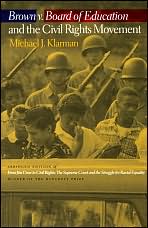Brown v. Board of Education

The Warren Court (1953)
This page lists articles that put into historical perspective the changes wrought by the Supreme Court decision Brown v. Board of Education (1954). Click here to read the Brown decision.
Commentary on Recent Supreme Court Decisions Involving Brown
- Mary L. Dudziak Why Thurgood Marshall Would Be Upset with the Roberts Court
- Stanley Fish History is at center of the court's ruling in the school race cases
- NYT News Story Can a Law Change a Society?
- Jim Castagnera Remembering “Brown v. Board of Education”
- Juan Williams Don’t Mourn Brown v. Board of Education
- Mary L. Dudziak Roberts misreads Brown and its history in today's school case
History
- Bonnie Goodman Interview with Michael J. Klarman, Winner of the 2005 Bancroft Prize
- Christopher W. Schmidt The Delusions Behind the Brown Decision
- Ian Haney Lopez The Supreme Court Case that Got Right What Brown Got Wrong
- Kansas State Historical Association"Brown v. Board of Education: The Case of the Century"--The Kansas Bar Association created a 70-minute video,"Brown v. Board of Education of Topeka: The Case of the Century," and related teaching materials as a project for the 50th anniversary of the landmark decision. The video features a reenactment of the 1952 and 1953 oral arguments presented to the U. S. Supreme Court. The video will run continuously during the exhibit, Equal Education: The Fight, The Right May 1 - 30, 2004, at the Kansas History Center and Museum.
- Eric Foner & Randall KennedyBrown at 50
- Michael Klarman The Supreme Court Has Never Been in the Vanguard of Social Reform
- Robert Jackson Symposium To commemorate and consider Brown at 50, the Robert H. Jackson Center recently hosted three special events in Jamestown, New York, and at nearby Chautauqua Institution. The symposium featured Nicholas Katzenbach, law clerks from the Supreme Court of 1954, and the sisters Linda Brown Thompson and Cheryl Brown Henderson, daughters of the late Oliver Brown of Topeka.
- Newsweek Photo Gallery from the Era of Brown
- Ellis Cose Why Brown Seems to Be a Bust
- Suzanne Sataline Charles Sumner Made the Case Against Segregated Schools a Century Before Brown
- Thomas Sowell We Are Still Paying the Price for the Faulty Reasoning in Brown
- Sara Hebel 50 Years After Brown Inequities Remain at Universities
- James Patterson Why It's Right to Remember Brown
- William Kashatus Despite Brown We Are Re-Segregating Our Schools
- Cass SunsteinBrown Reconsidered?
- Drew Jubera Why Wasn't It Brown vs. Alabama or Brown vs. South Carolina?
- Michael Klarman Why Brown Had Such an Impact
- Chronicle of Higher Education What New Books Are Saying About the Impact of the Brown Decision
- Justin EwersBrown V. Board of Education: 50 Years Later
- Rick Shenkman The Panel Devoted to Brown at the 2004 OAH Convention
